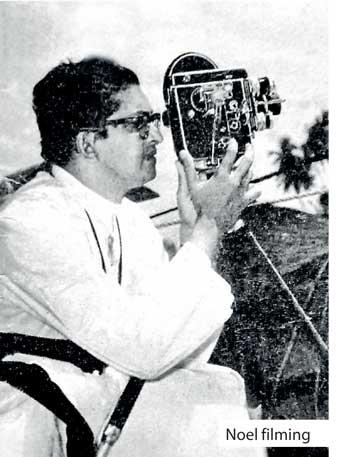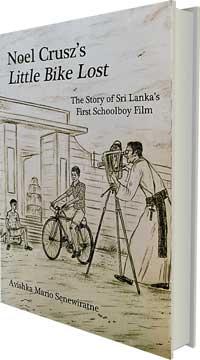Roman Catholic filmmaker Noel Crusz-by Robert Crusz

Source:Dailymirror

Noel Crusz was born in 1921 and ordained a Roman Catholic priest in the order of the Oblates of Mary Immaculate (OMI) in 1948. Finding that “celibacy is martyrdom”, as he wrote, he was dispensed from his vows and returned to lay status in 1965. He married in 1967, emigrated to Australia and passed away there in 2003.
The famous Australian journalist, the late Alan Gill, writing about Noel Crusz, said “He was at various periods, sometimes concurrently, priest, filmmaker, writer and journalist. Add ventriloquist, puppeteer, broadcaster, catechist, and beloved husband of his wife Tirzah, and you have the measure of the man.” Fr. Aloysius Pieris S.J. called him “ … a Catholic priest decades ahead of his country’s local Church in appreciating and fostering the catechetical potentialities of Social Media ….”
In a newly published book, “Noel Crusz’s Little Bike Lost – The story of Sri Lanka’s first Schoolboy Film” (2022), the author, Avishka Mario Senewiratne, sets out the journey of Noel Crusz, “the budding filmmaker” and “communicator”, from his early days as a writer of stage plays and radio plays, and articles to the newspapers, to his being made the director of Radio Ceylon’s “Catholic Hour” which under his creative leadership, became “one of the most listened to radio programmes in the East”. From there he was sent to study Radio Broadcasting and the Communication Arts in Europe and the USA. He became close friends with Bishop Fulton Sheen, arguably the first Catholic television personality in the USA, and with a host of famous Hollywood film stars, some of whom, especially Bing Crosby, helped him in his ministry as a priest-filmmaker when he returned to Ceylon.
In the ten years from 1950 to 1960, Fr. Noel Crusz made about nineteen films. Among them were documentary films on different Roman Catholic religious congregations and their work in Ceylon – on the Sisters of the Holy Family (1954) and the students of Holy Family Convent (1957), the Sisters of Charity of Jesus and Mary (1954), the Oblates of Mary Immaculate (1958), the Sisters of the Good Shepherd (1960), and on the Catholic missions in the North (1950). He filmed life on the island of Iranaitivu (1950) and in the Vedda country (1950). He made one documentary-drama film in 1958 – “The Road to Boys Town”, and thanks to Dr. P. R. Anthonis and Dr. Francis Silva, the renowned surgeons, Fr. Noel was granted his audacious wish to be the first filmmaker in Ceylon to be allowed into the operating theatre to film a surgery in progress (1957). Intrigued by the “invigorating splendour of chastity” (as he wrote), Fr. Noel travelled to Italy with his Bolex camera in 1953 and made a documentary colour film about his heroine, the Roman Catholic “Saint of the Century”, Maria Goretti (1890 – 1902), a peasant girl who was murdered by a young man because she defended her virginity.

Fr. Noel made three fiction feature films, “The Cross on the Sands” (1950), “Little Bike Lost” (1956) and “All My World” (1960). Little Bike Lost was a feature-length film of about 110 minutes made by the boys of “St. Joseph’s College Film Society” under the guidance of Fr. Noel Crusz when he was on the school’s staff. It was filmed on location in the school and around Colombo, in 16mm black and white with a Bolex H16 camera, using mostly naturally available light, with sound recorded separately. Unfortunately, it has been erased from the history of Sri Lankan cinema, and pride of place given to Lester James Peries’ “Rekava” (also in 1956) as the first Sri Lankan feature film made outside the studio, using natural light and dubbed sound. Hopefully this will be rectified with the publication of Avishka Mario Senewiratne’s “Noel Crusz’s Little Bike Lost”. This well-researched and well-written book is comprehensive and complete, and gives the whole story about Noel Crusz and the making of the film by the schoolboys of St Joseph’s College. The original 16mm celluloid film of Little Bike Lost has also been restored and digitally re-mastered by the Tulana Media Unit, with subtitles and a sound and music track added.







